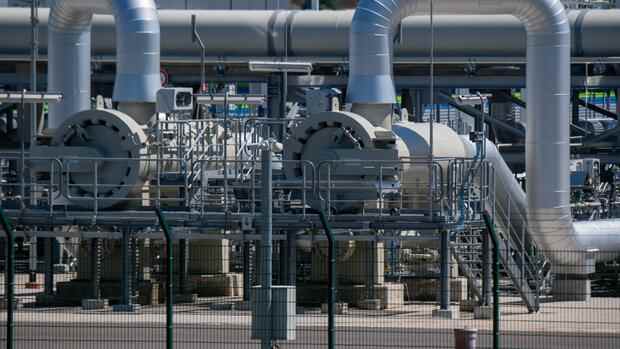The upcoming maintenance of the pipeline Nord Stream 1 puts the federal government under time pressure.
(Photo: dpa)
Berlin In view of an impending Russian gas supply stop to Germany, extensive government support measures for the economy and consumers are becoming increasingly likely. “I think it’s important to be active in both fields,” said Chancellor Olaf Scholz (SPD) on ARD.
With a view to the largest German gas importer Uniper, who got into trouble, Scholz said: “We are now examining with the company what can be done.”
Uniper, the largest gas trader in Germany, is the first large German energy company to find itself in an existential crisis as a result of the Ukraine war. This threatens to endanger the entire supply system. Hundreds of municipal utilities, energy suppliers and companies depend on Uniper’s deliveries. The municipal utilities, in turn, supply the majority of households with gas and electricity, water and heat.
Economics Minister Robert Habeck (Greens) already warned at a “Zeit” event on Saturday of a possible “price explosion” if Russia stopped delivering gas via the Nord Stream 1 gas pipeline and only delivered gas from other countries such as Norway or the Netherlands to Germany comes.
Top jobs of the day
Find the best jobs now and
be notified by email.
Supply situation at risk
The German Association of Cities already sees the security of supply at risk. “The pressure on the public utilities is increasing every day,” said General Manager Helmut Dedy of the German Press Agency. He called on the federal and state governments to prevent “municipal suppliers from getting into serious trouble”.
Economics Veronika Grimm warned that simply purchasing replacements on the gas market could lead to liquidity problems, even for large corporations, if the companies were unable to pass on the prices to their customers in a timely manner. “Here it must be prevented that the suppliers go to their knees due to the liquidity bottlenecks,” said the economist to the Handelsblatt. She brought up a “protective shield for the companies affected” that could be structured through loans as part of aid programs.
>>Read also: Concerted action: Clear expectations of relief at Scholz’s inflation summit
Grimm believes it is necessary for the higher prices to be passed on to customers. “Because it’s important that consumers – wherever possible – reduce their demand now so that as much gas as possible can be stored.”
At the same time, she warned that the “prompt and extensive” storage of gas must prevent a supply gap from occurring in winter. Because that would have “unpleasant consequential effects, such as cascading effects in the economy or an undersupply of households”.
Dedy appealed to the federal government to quickly grant affected municipal utilities liquidity aid through guarantees and loans. In addition, in his opinion, a moratorium must be introduced in the short term, which suspends the obligation to file for insolvency.
According to Dedy, transport companies, municipal hospitals, schools, baths and other public facilities would also feel the consequences of the energy crisis. He called for an honest debate: “We have to talk about what comforts we can do without and what remains necessary on site?” It’s about street lighting and traffic light switching, warm water in public buildings, museums and sports halls or fans in schools and air conditioning.
Bundesnetzagentur: Unequal gas distribution threatens
The President of the Federal Network Agency, Klaus Müller, appealed to the population to save energy. The question is whether the upcoming regular maintenance of the Nord Stream 1 natural gas pipeline “will become a longer-lasting political maintenance,” he told the Funke media group newspapers on Saturday. If the gas flow from Russia “is lowered for a longer period of time, we have to talk about savings more seriously”. The twelve weeks before the start of the heating season would have to be used to make preparations.
The top consumer advocate Jutta Gurkmann called for a “moratorium for gas customers who cannot pay their bills”. Households would also have to be supplied with energy in the event of insolvency, said the head of the Federal Consumer Association (VZBV) to the Handelsblatt. “No one should feel cold or sit in the dark because of the high energy prices.” It is quite possible that gas prices rose so much in the autumn that this would not only put a heavy financial burden on households with low but also on middle incomes.
According to the head of the network agency Müller, the gas flows in the Federal Republic have so far been more or less evenly distributed. “That could change if we only get gas from Norway, the Netherlands or Belgium,” he said, and again did not rule out that industrial companies would have to make do with less gas. “The moment the pressure in the gas network in a region falls below a certain minimum, the fuse in hundreds of thousands of gas boilers would suddenly kick in,” he said.
The public utilities could slip into insolvency if they do not pass on the energy costs.
(Photo: dpa)
That would have to be manually activated again by trained specialists if gas were available in the region again, he said. Nobody can want such a scenario, “because it would take a very long time to restore the gas supply. So it will always be the aim of the Federal Network Agency, if necessary, to order reductions in industrial consumption so that this scenario does not occur.
More: Many companies are at their breaking point because of energy prices
